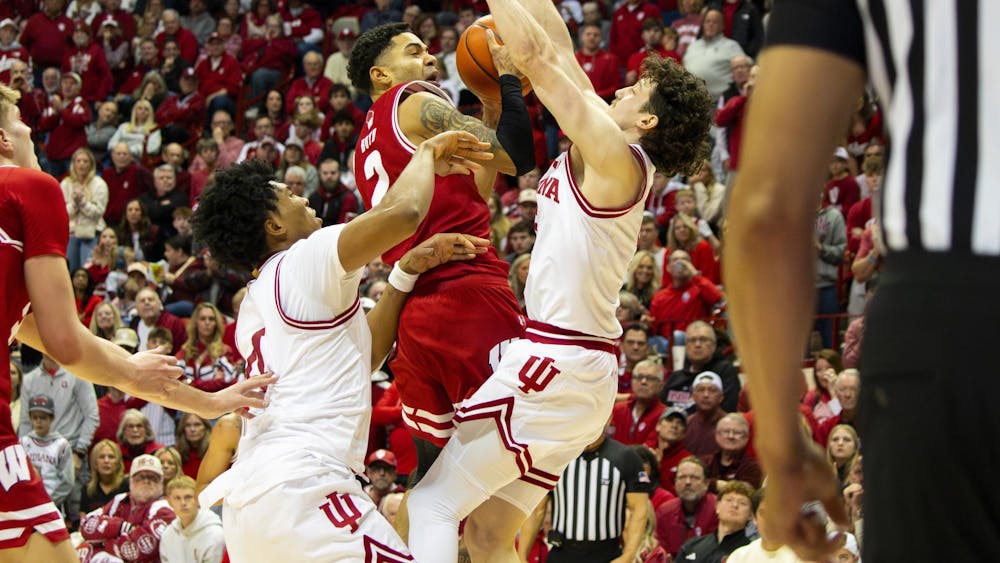To sit the bench, you've got to be able to stand your ground. It's the strength of mind required to judge a could-be-expelled student in their last chance at appeal or to settle an election contest between two dueling parties, each wanting their role in the university. Someone's college career could be on the line, and there's no room for indecisiveness. \nEleven student justices ready to make decisions that matter serve on the IU Student Supreme Court every year. These dynamic individuals serve as student representatives in judicial appeals, interpreters of the IU Student Association Constitution and Bylaws and arbitrators in study body election disputes.\n"It's really important that the campus knows that the court exists," said Associate Justice Samara Mindel, a senior. "A lot of people really don't know that they can appeal judicial board decisions or have us there for that extra step."\nOnce a student has been tried by a University j-board and been found responsible for violating the Code of Student Rights, Respon-sibilities and Conduct, the student can choose to appeal the decision.\nThe Hearing Commis-sion, the first to hear the appeal, is composed of one justice, along with an administrative and faculty member.\nMendel said hearing the j-board appeals can be the most challenging and rewarding aspect of serving on the court. \nThe commission does not have any previous information about the case. If guilt is determined, then the previous sanction or punishment can be upheld, or the commission can give a new one.\n"We try to help the student," Mindel says. "We try not to suspend or expel if we don't have to."\nSometimes serious sanctions can't be avoided.\nAssociate Justice Claire Carter, a senior, described the experience as "heart wrenching" for her, and Chief Justice Brian Clifford admitted it's hard to tell a student they will be expelled or suspended if the court determines guilt.\n"It's just tough to see people in unfortunate situations," Clifford, a senior, said. "You understand because you are a student, too … but we have a responsibility to protect other students on campus and do the best we can to enforce the rules fairly."\nIf a student requests an appeal of the hearing commission decision, his or her case will be sent to a campus review board, composed of the Chief Justice and an administrative and faculty member. \nAt the campus review board level, the student must prove his or her case was unfairly heard or treated by the judicial system.\nHearing student judicial appeals is just one function of the court. The court also has final say on any changes or interpretations of IUSA's Constitution and Bylaws. The Supreme Court also settles election disputes for IUSA student body elections.\n"Whatever decision is made, there's going to be people who love you for it and people who hate you for it," Clifford said. "Even if people disagree, they can't say we didn't try."\nTo take a crack at those tough cases, you've got to score one of the limited spots on the court. Justices go through a selective application process, and the IUSA president makes their appointment official. Justices are eligible to hold their position until they leave the University.\n"It's really hard to say what makes a good justice," Clifford said. "So many well-qualified people apply; it makes for a dynamic group."\nStudents are required to be in good academic standing, but all students, from freshmen to Ph.D students, can apply. The selection committee also looks for students who are involved on campus. \nThe ability to express your ideas clearly -- whether speaking or writing -- is also important, Clifford said.\n"We're not looking for the greatest legal minds in the world," he said. "It takes an entirely different type of skill to hear sensitive cases."\nAfter being selected and approved by the court, justices are trained in procedures as well as confidentiality and fairness. Another member of the court usually mentors the new justice so he or she can also learn from experience. Once on the court, justices have to be ready to speak their mind and speak it loudly, Carter said.\n"We are team in that we all work together, but we are all very unique leaders," she said. "You get all these really strong leaders in one room and everyone is expressing their opinions, so you've got to be able to stand up for yourself. You need to be able to jump in."\nClifford agreed and said he enjoys the exchange of ideas that take place during proceedings, as well as at the court's weekly meetings. He said he likes members who aren't afraid to argue with him and appreciates their willingness to put themselves on the line.\n"I'm glad when a justice dissents," he said. "It takes courage to go against the group. Without those opinions, you can totally ignore a point of view that you never took into account."\nThe other side of the argument is also important, Mindel said. She wrote the dissenting opinion during the controversial Steel v. Kirkwood election dispute last year.\n"I think it's really important that you have a very strongly held belief, you should speak," she said of her decisions within the court. "Even if you don't get what you want, it's still important that those opinions are out there."\nCarter pointed out it's a unique aspect of the University that lets students' opinions be heard in the first place.\n"I think it is essential that students are involved in judiciary decisions on campus. IU is very progressive in that sense," Carter says. "It's important for us to uphold that for students"
Students make call to order
Eleven justices responsible for final say in school judicial process
Get stories like this in your inbox
Subscribe





